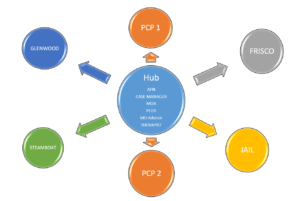×
- Services
- Resources
- Careers
- About Us
- Appointments
Opioid Use Disorder (OUD) impacts approximately 2 million Americans; those abusing prescription opioids, and 600,000 heroin users. In 2017, in Colorado there were more than 1,000 opioid -overdose deaths as a result of prescription opioids and illegal opioids. In 2017, Center for Disease Control identified 70,237 drug overdose deaths nationally; a dramatic increase. The gold standard treatment of individuals with OUD is medication-assisted treatment (MAT). The Hub and Spoke is a model for MAT therapy where a health care facility serves as the service “hub” and community-based providers serves as “spokes”. The purpose of this presentation is to describe the organizational structure of Hub and Spoke model of MAT in rural western Colorado, and quality/program evaluation projects planned.

In 2018, Mind Springs Health (MSH), a community mental health center, met with the local public health and primary care community, to develop strategies for treating individuals with OUD and decrease overdose deaths. The Hub and Spoke model of MAT was felt to be the best approach to address OUD in the local community. A Psychiatric Mental Health Nurse Practitioner obtained a suboxone waiver, and developed a care coordination team which also included a therapist, a medical office assistant, physician addiction specialist for consultation, and peer support staff. Patients were initially seen at MSH (the hub) and stabilized on Suboxone therapy. Once stable for one month, patients were referred back to waiver trained PCPs (spokes) in the community. If patients require more support after they have been transferred to a PCP, they return to the hub until stable.
Western Colorado is marked by largely rural areas scattered with small communities on the western slope of the Rockies. The largest city is Grand Junction located in Mesa County with a population of 61,881. Western Colorado is a health manpower shortage area for both primary care and psychiatric/behavioral health. Local primary care providers (PCPs) reach out to MSH for help managing patients with OUD. MSH, the largest provider of behavioral health services in western Colorado, accepted this primary care/behavioral health partnership.
In 2019-20, program evaluation and quality improvement activities projects are being planned in conjunction with the practice-transformation team and the public health in Grand Junction. The MAT program at MSH has been successful with expansion to 100 patients and an additional PMHNP being hired. Two PCP practices in the community are currently “spokes” and accept patients from the “hub”. Another “spoke infrastructure” is planned using tele-medicine to expand OUD treatment to other rural western Colorado communities.
The Hub and Spoke model has the potential to be an effective mechanism for providing MAT in western Colorado’s rural-underserved communities. Clearly practice based, program evaluation and quality improvement methodologies are needed to evaluate this model.
The Opioid use crisis has severely impacted western Colorado and other rural regions of the United States. The Hub and Spoke model is one approach to expand access to MAT in order to reduce opioid overdoses deaths.
Click to Enlarge